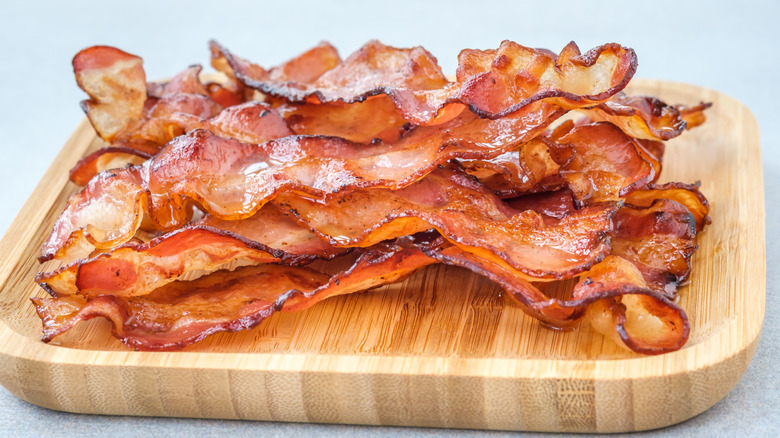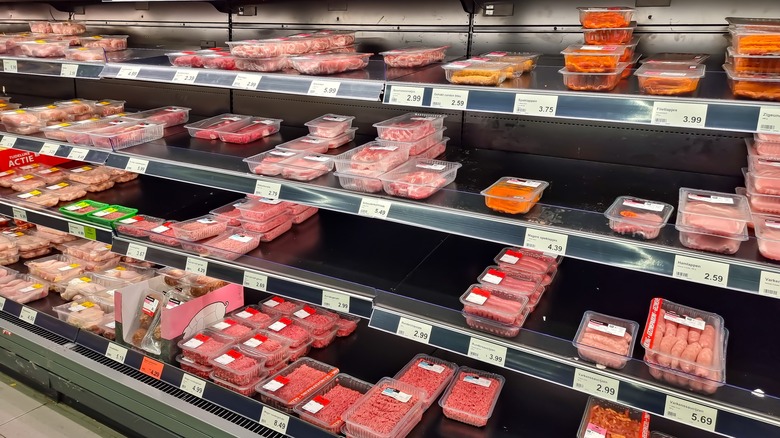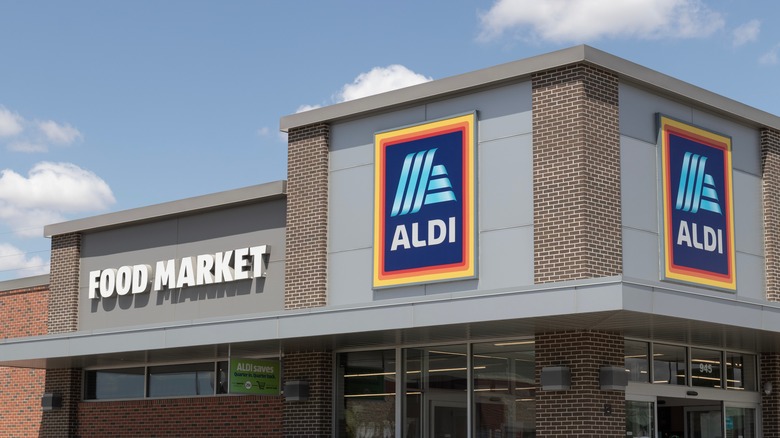The Conspiracy Theory Behind Aldi's Bacon Has Been Debunked
If you're a regular shopper at Aldi, chances are you've bought meat products from the chain, perhaps under its in-house brand Appleton Farms.The brand's bacon appears to be perfectly run-of-the-mill, but a bizarre scandal on social media poses a question that might make you jump: Is Aldi's bacon grown in a lab? This odd rumor began on Facebook, where a user claimed that the grocery store sources its pork product from a company that creates cat treats derived from ground beef, chicken, and mouse cells.
If all this sounds too outlandish to be true, that's because it is. Aldi does not source its Appleton Farms bacon from a laboratory, but from real pigs. How did such a wild conspiracy theory take the Internet by storm, and how did so many people fall for it? Apparently, it's all too easy to get your Appletons mixed up. The offending FB post confused Appleton Farms for Appleton Meats, a Canadian private research facility that specializes in growing animal cells synthetically.
Whether deliberately or by accident, the start of this conspiracy theory turned out to be based on nothing suspicious at all. So next time you shop for cheap groceries at Aldi, don't be afraid to take some of the bacon — it didn't come out of a test tube.
Lab-grown meat has probably not hit your local grocery store
Feeling paranoid about accidentally buying lab-grown bacon at the store, if not at Aldi? Don't worry: While both the U.S. Department of Agriculture and the Food and Drug Administration have approved the sale of cultured meat products in America, only one restaurant in Washington D.C., run by world-renowned chef José Andrés, sells the stuff. (One San Francisco joint called Bar Crenn used to serve artificially manufactured chicken, but took it off its menu in February 2024.)
Folks who actually want to try "cultured chicken" can visit China Chilcano, Andrés restaurant specializing in Peruvian cuisine. We're not sure the meat will wind up on the list of Andrés' most popular dishes, but we won't know until we try — and the chances of trying lab-grown meat outside of an expensive restaurant are pretty low.
As of May 2024, lab-grown meats have not grocery store hit shelves because of various production issues. Cultured protein manufacturers reach nowhere near the output of conventional meat farms, and the cost to make (for example) bacon out of a handful of cells greatly surpasses the amount of money it takes to slaughter and cure a pig. Ways of ramping up production and cutting down prices for lab-grown meat are under construction. If these products do wind up for sale in the near future, the USDA has already ruled that shoppers will see the term "cell-cultivated" on any lab-grown meat products.
Where does Aldi get its bacon from, then?
While it may not be entirely clear where Aldi gets its Appleton Farms bacon, rest assured that it probably came from farmers near your resident store's location. According to the grocer's website, any items that don't name their country of origin are made in America. This is in accordance with the USDA's guidelines, which require foreign goods to explicitly state where they came from on their packaging.
Since Aldi does not possess any farms or meat processing facilities, it largely relies on partnering with local suppliers who follow the company's animal care policies. Much like its quarter requirement for carts, this is one of the grocery chain's many cost-cutting measures that allow it to keep operating costs low. And while Aldi does not disclose exactly which farmers produce a particular product, most of its meat comes from regional suppliers that are in close proximity to specific store locations. Much like its locally-sourced produce, this allows the company to cut transportation costs considerably and deliver the low prices customers have come to expect.



